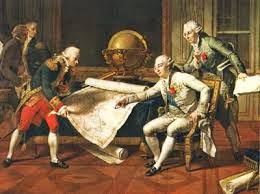The American Revolutionary War (1775–1783), the American War of Independence, or simply the Revolutionary War in the United States, began as a war between the Kingdom of Great Britain and the Thirteen Colonies, but gradually grew into a world war between Britain on one side and the newly formed United States, France, Netherlands,Spain, and Mysore on the other. American independence was achieved and European powers recognized the independence of the United States, with mixed results for the other nations involved.
 France, Spain and the Dutch Republic all secretly provided supplies, ammunition and weapons to the revolutionaries starting early in 1776. By June 1776 the Americans were in full control of every state, but then the British Royal Navy captured New York City and made it their main base. The war became a standoff. The Royal Navy could occupy other coastal cities for brief periods, but the rebels controlled the countryside, where 90 percent of the population lived. British strategy relied on mobilizing Loyalist militia and was never fully realized. A British invasion from Canada in 1777 ended in the capture of the British army at the Battles of Saratoga.
France, Spain and the Dutch Republic all secretly provided supplies, ammunition and weapons to the revolutionaries starting early in 1776. By June 1776 the Americans were in full control of every state, but then the British Royal Navy captured New York City and made it their main base. The war became a standoff. The Royal Navy could occupy other coastal cities for brief periods, but the rebels controlled the countryside, where 90 percent of the population lived. British strategy relied on mobilizing Loyalist militia and was never fully realized. A British invasion from Canada in 1777 ended in the capture of the British army at the Battles of Saratoga.
That American victory persuaded France to enter the war openly in early 1778, balancing the two sides' military strength. Spain and the Dutch Republic—French allies—also went to war with Britain over the next four years, threatening aninvasion of Great Britain and severely testing British military strength with campaigns in Europe, Asia, and the Caribbean. Spain's involvement resulted in the expulsion of British armies from West Florida, securing the American southern flank. The British naval victory at the Battle of the Saintes thwarted a French and Spanish plan to drive Britain out of the Caribbean and preparations for a second attempt were halted by the declaration of peace. A long Franco-Spanish siege of the British stronghold atGibraltar also resulted in defeat.
French involvement proved decisive yet expensive, ruining France's economy and driving the country into massive debt. A French naval victoryjust outside Chesapeake Bay led to a siege by combined French and Continental armies that forced a second British army to surrender atYorktown, Virginia, in 1781. Fighting continued throughout 1782, while peace negotiations began.
In 1783, the Treaty of Paris ended the war and recognized the sovereignty of the United States over the territory bounded roughly by what is now Canada to the north, Florida to the south, and the Mississippi River to the west. A wider international peace was agreed, in which several territories were exchanged.

